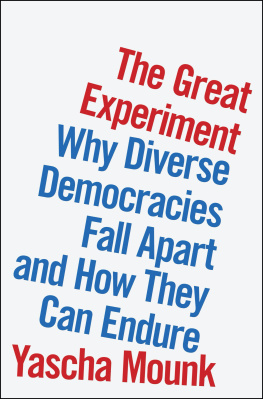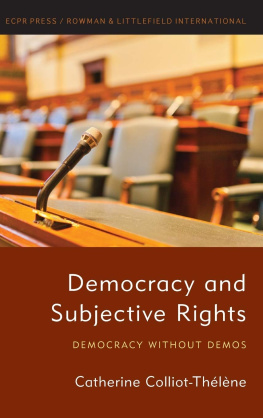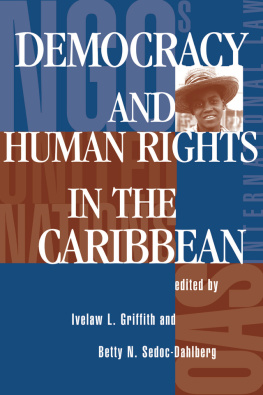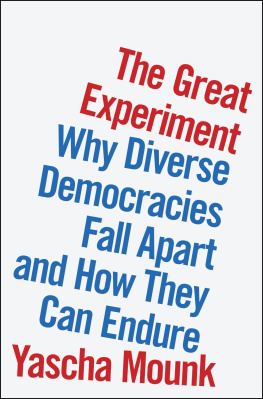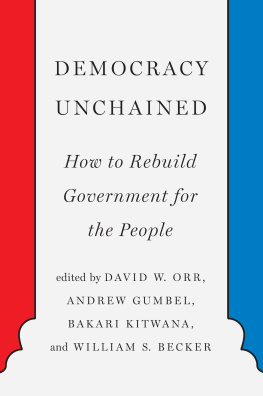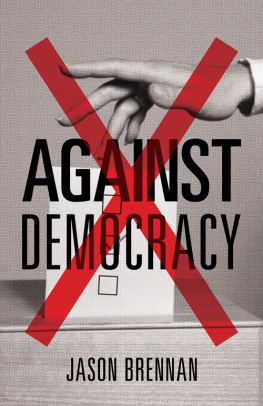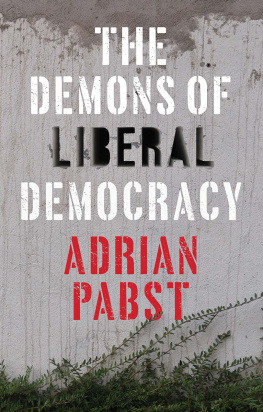978-0-674-97682-5 (alk. paper)
Names: Mounk, Yascha, 1982 author.
Title: The people vs. democracy: why our freedom is in danger and how to save it / Yascha Mounk.
Description: Cambridge, Massachusetts: Harvard University Press, 2018. | Includes bibliographical references and index.
Subjects: LCSH: Democracy. | Populism. | Authoritarianism. | Human rights. | Political participation.
Classification: LCC JC423 .M685 2018 | DDC 321.8dc23 LC record available at https://lccn.loc.gov/2017045238
THERE ARE LONG DECADES in which history seems to slow to a crawl. Elections are won and lost, laws adopted and repealed, new stars born and legends carried to their graves. But for all the ordinary business of time passing, the lodestars of culture, society, and politics remain the same.
Then there are those short years in which everything changes all at once. Political newcomers storm the stage. Voters clamor for policies that were unthinkable until yesterday. Social tensions that had long simmered under the surface erupt into terrifying explosions. A system of government that had seemed immutable looks as though it might come apart.
This is the kind of moment in which we now find ourselves.
Until recently, liberal democracy reigned triumphant. For all its shortcomings, most citizens seemed deeply committed to their form of government. The economy was growing. Radical parties were insignificant. Political scientists thought that democracy in places like France or the United States had long ago been set in stone, and would change little in the years to come. Politically speaking, it seemed, the future would not be much different from the past.
Then the future cameand turned out to be very different indeed.
Citizens have long been disillusioned with politics; now, they have grown restless, angry, even disdainful. Party systems have long seemed frozen; now, authoritarian populists are on the rise around the world, from America to Europe, and from Asia to Australia. Voters have long disliked particular parties, politicians, or governments; now, many of them have become fed up with liberal democracy itself.
Donald Trumps election to the White House has been the most striking manifestation of democracys crisis. It is difficult to overstate the significance of his rise. For the first time in its history, the oldest and most powerful democracy in the world has elected a president who openly disdains basic constitutional authoritarian to the highest office in the land is a very bad omen.
And the election of Trump is, of course, hardly an isolated incident. In Russia and Turkey, elected strongmen have succeeded in turning fledgling democracies into electoral dictatorships. In Poland and Hungary, populist leaders are using that same playbook to destroy the free media, to undermine independent institutions, and to muzzle the opposition.
More countries may soon follow. In Austria, a far-right candidate nearly won the countrys presidency. In France, a rapidly changing political landscape is providing new openings for both the far left and the far right. In Spain and Greece, established party systems are disintegrating with breathtaking speed. Even in the supposedly stable and tolerant democracies of Sweden, Germany, and the Netherlands, extremists are celebrating unprecedented successes.
There can no longer be any doubt that we are going through a populist moment. The question now is whether this populist moment will turn into a populist ageand cast the very survival of liberal democracy in doubt.

After the fall of the Soviet Union, liberal democracy became the dominant regime form around the world. It seemed immutable in North America and Western Europe, quickly took root in formerly autocratic countries from Eastern Europe to South America, and was making rapid inroads across Asia and Africa.
One reason for liberal democracys triumph is that there was no coherent alternative to it. Communism had failed. Islamic theocracy had precious little support outside the Middle East. Chinas unique system of state capitalism under the banner of communism could hardly be emulated by countries that didnt share its unusual history. The future, it seemed, belonged to liberal democracy.
The idea that democracy was sure to triumph has come to be associated with the work of Francis Fukuyama. In a sensational essay published in the late 1980s, Fukuyama argued that
Plenty of critics took Fukuyama to task for his supposed naivet. Some
Despite the vociferous criticism, Fukuyamas core assumption proved highly influential. Most of the people who warned that liberal democracy might not triumph around the world were just as sure that it would remain stable in the democratic heartlands of North America and Western Europe. Indeed, even most political scientists, far too careful to make sweeping proclamations about
Awed by the unparalleled stability of wealthy democracies, political scientists began to conceive of the postwar history of many countries as a process of democratic consolidation. build a vibrant civil society and ensure the neutrality of key state institutions like the judiciary. Major political forces had to accept that they should let voters, rather than the might of their arms or the thickness of their wallets, determine political outcomes. All of these goals frequently proved elusive.
Building a democracy was no easy task. But the prize that beckoned was both precious
So confident were political scientists in this assumption that few considered the conditions under which democratic consolidation might risk running in reverse. But recent events call this democratic self-confidence into question.
A quarter century ago, most citizens of liberal democracies were very satisfied with their governments and gave high approval ratings to their institutions; now, they are more disillusioned than they have ever been. A quarter century ago, most citizens were
Just take two examples drawn from my own research: Over two-thirds of older Americans believe that it is extremely important to live in a democracy; among millennials, less than one-third do. The sinking attachment to democracy is also making Americans more open to authoritarian alternatives. Back in 1995, for example, only one in sixteen believed that army rule is a good system of government;
Under these radically changed circumstances, it would be foolhardy to assume that the stability of democracy is sure to persist. The first big assumption of the postwar erathe idea that rich countries in which the government had repeatedly changed hands through free and fair elections would forever remain democratichas, all along, stood on shaky ground.
If the first big assumption that shaped our political imagination has turned out to be unwarranted, theres reason to reexamine the second big assumption as well.


